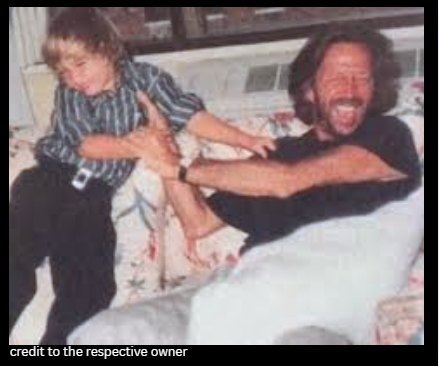The last thing Eric Clapton’s 4-year-old son said was “See you later, Daddy.”

The last thing Eric Clapton’s 4-year-old son said was “See you later, Daddy.” Twenty minutes later, a janitor’s mistake would change music history forever.
March 20, 1991.Portable speakers
By that morning, Eric Clapton had already lived several lifetimes. He’d survived heroin addiction that should have killed him. He’d watched alcohol nearly destroy everything. He’d buried friends—Jimi Hendrix, Duane Allman, Stevie Ray Vaughan—all lost to the chaos that seems to follow genius.
But in 1987, something shifted. Clapton got sober. And in 1986, he’d been given a reason to stay that way: his son Conor was born.
Conor’s mother was Lori Del Santo, an Italian actress. Though they weren’t together as a couple, they shared custody. And Clapton—this man who’d survived decades of self-destruction—discovered that being a father was the only thing that had ever truly saved him.
Conor was four years old on that March morning. He was staying at his mother’s high-rise apartment on the 53rd floor of a building on East 57th Street in Manhattan. Clapton was supposed to pick him up soon. They were going to the Bronx Zoo—just a father and son spending a spring day together.
The apartment was being cleaned. A janitor was washing the windows. He opened one of the large living room windows to clean the outside glass.
Conor, excited about seeing his dad and going to the zoo, came running through the apartment the way four-year-olds do when they’re happy. He didn’t know the window was open. He thought the glass was there, like it always was.
He ran full speed.
And he fell.Fifty-three stories.
By the time Clapton arrived at the building—just minutes later—his son was gone.
There are losses so profound that the human mind cannot process them in real-time. The death of a child doesn’t just erase the present—it erases every future. Every birthday that will never come. Every Christmas morning. Every “I love you, Dad” that will never be spoken. Every moment, gone in an instant that replays in your mind forever.
For Eric Clapton, the man who had always turned to music when words failed, there was only silence. For weeks after Conor’s death, he couldn’t touch his guitar. The thought of playing seemed obscene. How could there be music when Conor no longer existed?
But grief is strange. It demands expression, even when expression feels impossible. Slowly, agonizingly, Clapton reached for his guitar—not because the pain had lessened, but because music was the only language that could hold what words could not.
“Tears in Heaven” emerged from that darkness. Co-written with lyricist Will Jennings, it became one of the most powerful expressions of parental grief ever recorded:
“Would you know my name if I saw you in heaven?
Would it be the same if I saw you in heaven?”
Every line trembles with a question no parent should ever have to ask: Will my child remember me when we meet again?
Yet “Tears in Heaven” was both a gift and a wound. For years, Clapton performed it because audiences expected it. But every performance reopened the deepest wound—forcing him to stand on stage before thousands and relive his son’s death over and over.
By the 2000s, Clapton largely stopped performing it. He later said: “I didn’t feel the loss anymore, which is so much a part of performing those songs. They’re kind of gone and I really don’t want them to come back.”
But Conor’s death transformed Clapton in ways that went beyond a song:
His sobriety, which began in 1987, became unshakable. It was no longer about his career or health—it was about honoring Conor. About being the father his son deserved, even in death.
In 1998, Clapton founded the Crossroads Centre in Antigua—a treatment facility for people struggling with addiction. He’s funded it through benefit concerts for decades. The center has helped thousands find sobriety. Conor’s death became both the wound and the guiding light.
Today, Eric Clapton is 79 years old. He’s been sober for over 37 years. He rarely speaks publicly about Conor, but when he does, the truth is clear: the loss never leaves.
But he transformed unbearable grief into something that has helped millions. “Tears in Heaven” gave voice to silent suffering. It said: You are not alone. Your grief is seen. Your love is valid.
And in choosing sobriety, in founding Crossroads Centre, in continuing to create despite the loss—Clapton chose to honor Conor by living a life worthy of his memory.
Conor Clapton lived only four years. But his brief life had an impact so profound that it changed his father—and through his father’s music, touched millions.
The brightest lights sometimes shine the shortest. But their warmth can last forever.